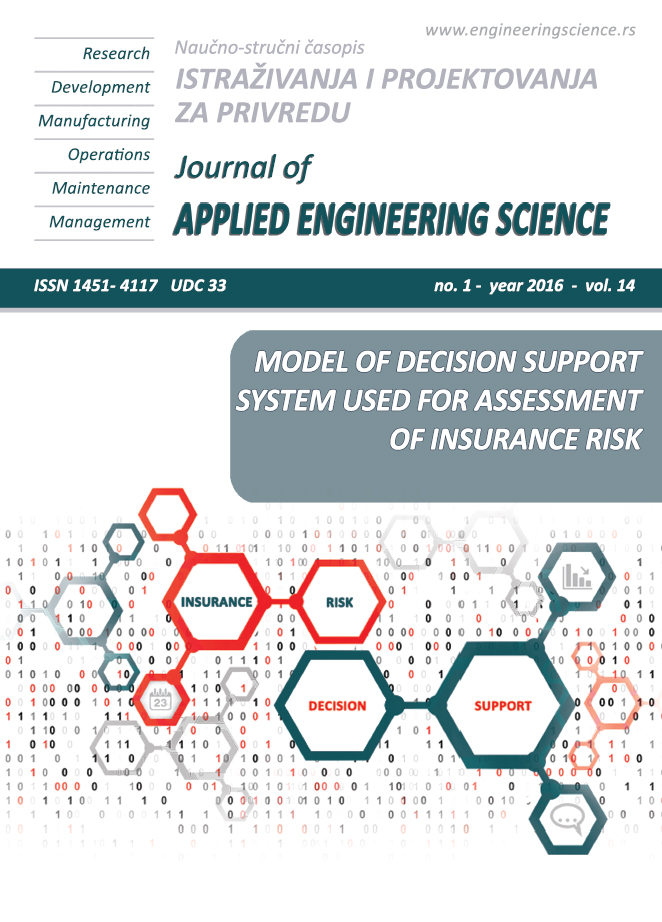CONSTRUCTION WORK TASKS DURATION: NEW METHOD OF ESTIMATION AND QUALITY CONTROL
Abstract
The article considers the principles of ensuring the completion of construction projects to meet the date. The authors suggest the method of assessing the progress of the project and estimating timely completion of the project based on the application of the Schedule Timeless Index (STI) and the Schedule Progress Index (SPI). The method allows to analyze dynamically the deviation of the timing of the project for prompt adoption of effective management decisions
References
Archibald, R.D. (2003): Managing High-Technology Programs and Projects, 3rd Edition p. 396.
Bovteev, S., Terentieva, E. (2014): Construction project schedule control, Projectand Program Management, No.2, pp. 158-173.
Ćetković J., Rutešić S., Zarković M., Knežević M., Vatin N. (2015): Primary directions and advancements in competitiveness of montenegrin construction sector, Procedia Engineering, 117 (1), pp. 780‐790.
Ćetković, J., Knežević, M., Žarković, M., Murgul, V., Vatin, N. Development and competitiveness improvement of the construction sector in Montenegro (2014) Applied Mechanics and Materials, Vols. 638-640, pp. 2465-2470.
Chatfield, C., Johnson, T. (2013): Microsoft Project 2013. Step by step, Redmond, Washington.
Chegotova, E.V. (2012): The Role of technical customer in the organization of investment activities in construction, Magazine of Civil Engineering, 29(3), pp. 5-11.
Heldman, K. (2009): PMP: Project Management Professional Exam study Guide, 5th Edition, p. 677.
Homutinnikova, K. C. (2009): Evaluation Criteria methods of verification used in managing construction projects, Management projects and programs, No.4, pp. 312-323.
ICB – IPMA Competence Baseline (2006): Version 3.0. Nijkerk, The Netherlands.
L.Lynch. (2010): On Time and under budget: a project management method critical chain (2010) pp. 354.
Project Management Body of Knowledge (2012): 5th ed. Project Management Institute. Newtown Square, Pennsylvania.
Project Management in Construction. Fourth Edition. pp. 285.
Ptukhina, I.S. (2011): Methodology of the distribution of economic justice the perpetrators for the delay of completion, Kuban state agrarian University, 04(68), pp. 383-394.
Pukhkal, V., Murgul, V., Garifullin, M. (2015): Reconstruction of Buildings with a Superstructure Mansard: Options to Reduce Energy Intensity of Buildings, Procedia Engineering, Vol. 117, pp. 624-627.
Rutešić S., Ćetković J., Knežević M., Žarcković M., Vatin N. (2015): Institutional framework, current investments and future strategic direction for development of construction sector in Montenegro, Procedia Engineering, 117 (1), pp. 642‐650.
Rutešić S., Ćetković J., Žarcković M., Knežević M., Vatin N. (2015): Analysis of the situation in montenegrin civil engineering sector from the point of application of national regulations and the EU technical standards in construction, Procedia Engineering, 117 (1), pp. 905‐915.
Schlagbauer, D., Heck, D. (2013): Change in output performance due to prolonged work, ISEC 2013 - 7th International Structural Engineering and Construction Conference: New Developments in Structural Engineering and Construction, pp. 1375-1380.
Suetin, S.N., Titov, S.A. (2014): Project portfolio management: strategic level of project management, Economy and Entrepreneurship, 5-2 (46-2), pp. 509-515.
Vatin, N.I., Kolosova, N.B., Berdyugin, I.A. (2013): Efficiency of application of automatic control systems, accugrade in construction, Construction of Unique Buildings and Structures, 4 (9), pp. 29-35.
W. Lipke. (2012): Earned schedule contribution to project management, PM World Journal, Vol. 1, Issue 2.
Werkl, M, Heck, D. (2011): Coping with incompleteness: An approach using time and production related compensation, ISEC 2011 - 6th International Structural Engineering and Construction Conference: Modern Methods and Advances in Structural Engineering and Construction, pp. 279-284.
Williams, D.L. Krazer, E.B. (2012): Oracle Primavera P6 Version 8: Project and Portfolio Management: A comprehensive Guide to managing projects, resources, and portfolios using Primavera P6, through version 8.2. Birmingham & Mumbai: PACKT Publishing.
Yakovlev, Y.V. (2010): Mechanisms of management of complex investment and construction project, Moscow: Creative house.
Yu. N. (2008): Lapygin Project management: from planning to evaluation, Moscow: Omega-L, p. 252.
Zakieva, N.M., Sirazetdinov, R.M. (2011): Corporate project management system as management mechanism of innovative projects in investment-construction complex, News of the Kazan, No.3, pp. 211-218.

